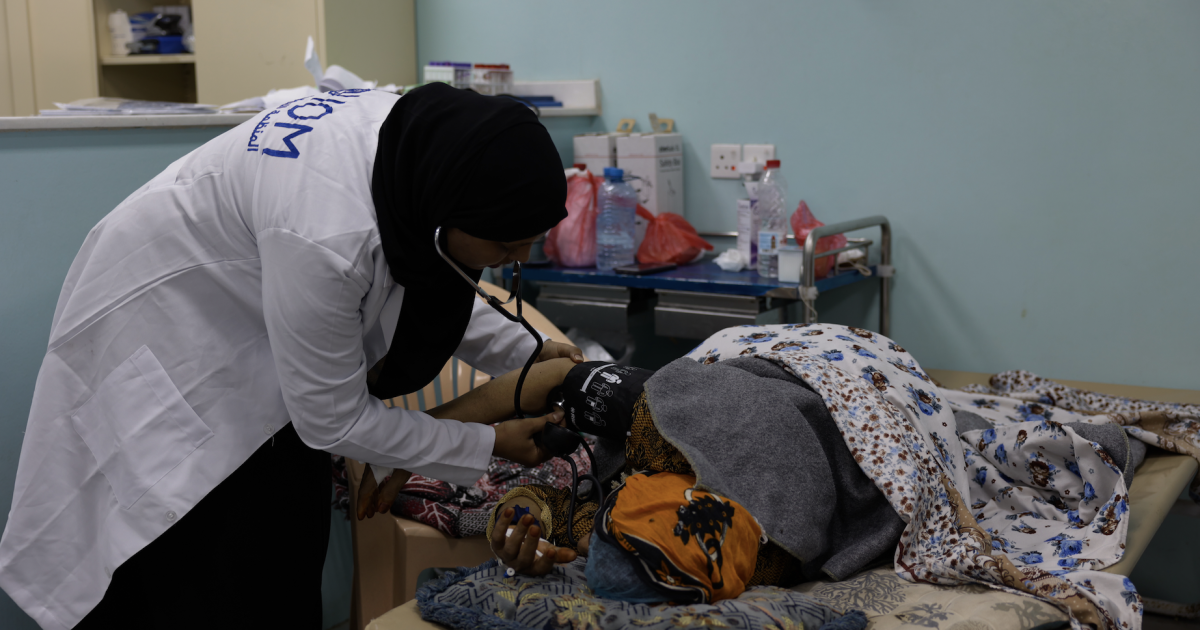Sana’a/Aden, 21 June – The International Organization for Migration (IOM) is bolstering its efforts to address the rapidly escalating Acute Watery Diarrhea (AWD) and cholera outbreak nationwide, which has already seen over 30,000 suspected cases since the beginning of the year.
From 2016 to 2022, Yemen faced the largest ever reported cholera outbreak in recent history, with over 2.5 million suspected cases and 4,000 deaths amid its ongoing conflict. The recent wave, particularly alarming due to its spread across multiple governorates, has been exacerbated by heavy rains and subsequent flooding, increasing the risk of water contamination. Health experts anticipate that the number of suspected cases could reach 255,000 by September 2024 if the preparedness and response activities are not scaled up to optimal levels.
“With support from humanitarian partners and our donors, we are working tirelessly to provide critical health and sanitation services to the most vulnerable populations,” declared IOM’s Acting Chief of Mission in Yemen, Matt Huber. “Together, we are striving to alleviate the suffering of those affected by cholera, particularly in remote and underserved areas, mitigate the impact of this crisis, and save lives amidst these challenging circumstances.”
Working closely with the Ministry of Public Health and Governorates Health Offices (GHO), and in support of government efforts, IOM is enhancing healthcare services in Aden, Lahj, Ma’rib, Sa’dah, and Sana’a. Recognizing the significant health service gaps for migrants in Shabwah, IOM has also supplied essential medical supplies and cholera treatment medications to the GHO in Shabwah, strengthening local healthcare capacity.
Additionally, IOM’s Mobile Medical Teams (MMTs) that operate along coastal areas and migrant arrival points in Yemen are identifying and treating cases of AWD and potential cholera among migrants and conducting health awareness-raising sessions. Aligning with the national cholera response plan, IOM has mobilized 14 MMTs to strengthen these efforts.
As part of its recent cholera response, IOM established 20 Oral Rehydration Points (ORPs) at public healthcare facilities and provided support to five Diarrhea Treatment Centres (DTCs) in Aden, Lahj, and Ta’iz. This is to ensure that all its supported health facilities and MMTs are well equipped to function as ORPs.
With the onset of a second wave, IOM is actively supporting an additional three DTCs, including facilities in Sana’a, Sa’dah and Ma’rib. These interventions enable underserved communities to access essential services to prevent and respond to the spread of AWD/cholera, thereby enhancing overall health service provision.
IOM’s integrated preparedness and response strategy ensures that Water, Sanitation, and Hygiene (WASH) facilities are available in treatment centres to prevent the spread of infection among patients and medical staff. Since contaminated water is a major risk factor according to cluster assessments, IOM provides automatic chlorinators, water treatment chemicals, and cholera and hygiene kits to vulnerable communities, as well as appropriate training.
Through these efforts, from October 2023 to May 2024, IOM recorded 5,319 AWD/suspected cholera cases among migrants who received health services at IOM-supported health facilities and through mobile teams. Since November 2023, a total of 7,526 AWD/suspected cases have been screened across IOM-supported DTCs, with 2,047 individuals admitted for treatment.
NOTE TO EDITORS
Together with the Health and WASH clusters and humanitarian partners, IOM has significantly bolstered its response to this critical health crisis. Since the outbreak in late 2023, IOM has been a key member of the national Cholera Taskforce, co-leading the Infection Prevention and Control (IPC) and Case Management pillars. IOM plays a crucial role in responding to and preventing AWD and cholera outbreaks by swiftly delivering essential health and WASH services.
The countrywide, multisectoral response plan requires USD 28 million to effectively manage, monitor, and prevent the spread of cholera and AWD symptoms. Continued support is crucial and additional funding is urgently needed to sustain these life-saving efforts. As the situation evolves, IOM stands ready to further scale up preparedness and response activities in close coordination with the Cholera Taskforce.
IOM’s cholera response in Yemen is supported by EU Humanitarian Aid (ECHO), USAID’s Bureau for Humanitarian Assistance (BHA), and the Yemen Humanitarian Fund (YHF).
Read more about IOM’s cholera response efforts:
Cholera Response Update │ May 2024 English │ Arabic
For more information, please contact:
In Yemen: Monica Chiriac, [email protected]
In Cairo: Tamim Elyan, [email protected]
In Geneva: [email protected]



